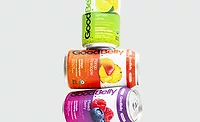Weight management ingredients battle obesity epidemic
Helping consumers drink away the pounds
Although some segments of the beverage industry often are associated with the obesity epidemic in America, more than half of consumers believe they are responsible for their own weight, according to research by The Hartman Group, Bellevue, Wash. The market research firm reports that 57 percent of consumers surveyed in 2010 strongly agreed that they are responsible for choosing the right foods to eat instead of manufacturers, and 54 percent strongly agreed that only they are responsible for their own weight.
| Jump to: |
Nevertheless, beverage-makers still are tasked with providing options that enable consumers to manage their weight. Therefore, the Healthy Weight Commitment Foundation (HWCF) set a goal for 16 of America’s top food and beverage companies to reduce the number of calories in the marketplace by 1.5 trillion by 2015. In May, the HWCF reported that the group already exceeded that goal. Participating beverage companies included PepsiCo, Purchase, N.Y.; The Coca-Cola Co., Atlanta; Kraft Foods Group Inc., Northfield, Ill.; Nestlé USA, Glendale, Calif.; Unilever, Englewood Cliffs, N.J.; and Campbell Soup Co., Camden, N.J.
However, reducing calories isn’t the only solution when it comes to weight management.
Clinically proven
“There is interest in weight management products outside low-fat, low-calorie, no-sugar benefits,” says Paul Dijkstra, chief executive officer of InterHealth Nutraceuticals, Benicia, Calif. “While continued demand from weight-conscious consumers means increased sales of weight management functional foods and beverages, to ensure that your product becomes the functional food or beverage of choice, it is imperative that your product stands out from the competition. Inclusion of innovative science-backed ingredients that have insignificant or no impact on the overall taste profile of the finished product can help ensure the success of your product.”
For instance, InterHealth Nutraceuticals offers Super CitriMax and ChromeMate ingredients for inclusion in weight management-positioned beverages. Super CitriMax helps consumers maintain a healthy body weight by suppressing appetite, increasing satiety, and inhibiting fat production, Dijkstra explains. ChromeMate works by supporting balanced blood sugar levels, increasing fat loss, and maintaining lean body mass, he says. Both ingredients are highly soluble and virtually tasteless, odorless and colorless, he adds.
Icon Group LLC, a NutraGenesis affiliate company based in Brattleboro, Vt., also offers a portfolio of weight management ingredients. Its WellTrimiG is an authentic, patented African mango seed extract that is clinically proven to help decrease weight and waist circumference when 150 mg is taken twice daily before meals, the company says. It helps improve the function of leptin, which is a hormone that plays an important weight management role in the body governing satiety, appetite control, thermogenesis and blood sugar balance, says Bruce Abedon, director of scientific affairs for Icon Group. WellTrimiG also helps increase levels of adiponectin, which is a hormone associated with cardiovascular health and thermogenesis, and inhibits glycerol-3-phosphate dehydrogenase, which is an enzyme that converts blood sugar into stored fat, he adds.
Additionally, the company offers LeptiCore, which also helps improve leptin function; Synetrim CQ, which helps to reduce calorie absorption by blocking the activity of digestive enzymes that break down dietary fat and carbohydrates; and SensorilTrim, which is clinically proven to reduce stress levels as well as cortisol, a hormone that is associated with stress, irritability and mood-induced overeating, Abedon says.
“Often when people try to lose weight, they become irritable and stressed, which can lead to overeating of high-calorie, carbohydrate- and fat-laden comfort foods,” he says. “SensorilTrim provides resistance to stress-induced snacking and overeating.”
Icon Group’s new TrimElite ingredient blends LeptiCore and SensorilTrim to help support healthy weight management and metabolic wellness in a multifunctional manner, the company says.
“Often when people try to lose weight, they become irritable and stressed, which can lead to overeating of high-calorie, carbohydrate- and fat-laden comfort foods. SensorilTrim provides resistance to stress-induced snacking and overeating.” |
Ingredients such as conjugated linoleic acid (CLA), citicoline, l-carnitine and many others also play a role in weight management, says Jeremy Bartos, senior innovation scientist at Glanbia Nutritionals, Carlsbad, Calif. Furthermore, protein, fiber, non-nutritive sweeteners and natural ingredients are important aspects of weight management, according to experts. And with the subject of obesity consistently in the media, consumers are more aware of the consequences of weight gain, thus adding value to ingredient solutions, suggests Russ Hazen, raw materials and innovations specialist at Fortitech Inc., Schenectady, N.Y.
“According to Transparency Market Research, the global weight management market is expected to reach $650.9 billion in 2015,” he says. “With mainstream media constantly reporting on the global obesity epidemic, the public is much more aware of issues that can result from being overweight, such as Type 2 diabetes, cardiovascular health, etc.”
Plus, approximately two-thirds of the U.S. population is overweight or obese, says Sam Wright IV, chief executive officer for The Wright Group, Crowley, La. Therefore, weight management will be the defining issue of the U.S. health care crisis for decades to come, he says.
However, weight loss is not consumers’ primary concern, Glanbia’s Bartos says. Consumers have shifted their focus from general weight loss to weight management beverages with more specific claims, he says. They are looking for products that can help control hunger and boost satiety, increase metabolism and promote thermogenesis, burn fat and block or limit fat storage in the body, and swap fat mass for lean muscle mass, Bartos adds.
Boosting satiety
Whey and soy protein, for instance, can help to boost satiety and build lean muscle mass, Bartos says. Whey protein also might have the ability to suppress consumers’ appetites, says Gwen Bargetzi, director of marketing for Hilmar Ingredients, Hilmar, Calif.
“Recent research suggests that whey protein can play an important role in helping people control their weight,” she says. “We generally feel more full when consuming protein than when consuming the same calories of carbohydrates, in part because we digest carbohydrates more quickly. But whey protein offers an additional benefit. A component in whey, glycomacropeptide (GMP), may act as an appetite suppressant by stimulating an intestinal hormone that reduces gastric secretion.”
Although whey protein typically is consumed in beverage applications such as meal replacement drinks, diet shakes and sports drinks, new wellness beverages target specific health needs and lifestyles, Bargetzi says. For example, time-pressed consumers can move from conventional canned shakes to protein-fortified waters, she says. In bottled water, the company’s Hilmar 9420 whey protein isolate (WPI) can provide hydration as well as protein to help consumers fight hunger, she explains. The ingredient offers high clarity and also brings an improved flavor profile to diet beverages by helping to reduce astringency in low-pH systems, she adds. This opens the ingredient up to categories such as juice, tea and coconut water.
Plus, merging whey protein with fiber provides an extra measure of satiety, she notes.
Archer Daniels Midland (ADM) Co., Decatur, Ill., offers Clarisoy isolated soy proteins, which are well suited for fortified waters, sports nutrition beverages, citrus-based drinks, fruit-flavored beverages, powdered drink mixes and fruit juice blends, the company says. Clarisoy 100 enables 100 percent soluble protein fortification in beverage applications with a pH below 4.0, and Clarisoy 150 has high solubility in higher pH ranges, it adds. The company also offers a line of Fibersol dietary fibers, including Fibersol-LQ liquid corn syrup, Fibersol-2 highly concentrated dietary fiber, Fibersol-2 AG agglomerated digestion-resistant maltodextrin, and Fibersol-HS highly concentrated dietary fiber plus natural sweeteners.
Although the fiber-fortified beverage market is relatively small, beverage-makers see a lot of opportunity for growth, says Patrick Luchsinger, nutrition marketing manager with Ingredion Inc., Westchester, Ill.
“While the old idea of fiber in a beverage may still call to mind powdered drink mixes or thick, nutritional supplement-type drinks, advances in ingredient technology like Nutriose soluble fiber now enable beverage developers to add significant levels of fiber to a range of mainstream beverages, from juices to enhanced waters that taste great and provide additional value,” he says.
Supported by a growing body of scientific evidence, Nutriose soluble fiber has shown positive effects of reducing feelings of hunger and caloric intake, Luchsinger says. “The modulation of the microbial ratios in the gut flora composition may enlighten these results,” he adds. “The slow and prolonged production of short chain fatty acids along the colon may provide delay or reduce hunger feelings.”
The fiber comes as a process-stable agglomerated powder that rapidly and invisibly disperses in liquids, he says.
Cutting calories
Inulin, a soluble dietary fiber, also can play a role in calorie and sugar reduction, says Deborah Schulz, product line manager for specialty carbohydrates with Cargill, Minneapolis. It is low in calories and can be used in conjunction with a high-intensity sweetener to replace sugar or fat, she says.
Sweeteners also have the ability to cut calories when used alone by reducing sugar content.
Decatur, Ill.-based Tate & Lyle, which produces Sta-Lite polydextrose and Promitor soluble corn fiber, also offers a range of sweeteners for the beverage industry.
“Interest in health and wellness is driving initiatives such as calorie reduction for weight management,” says Jeremy Thompson, director of product management for natural sweeteners at Tate & Lyle. As a result, the company has noticed a preference for its zero-calorie Purefruit monk fruit extract versus sugar, he adds. Its high-intensity sweetener Splenda sucralose also is effective in reducing calories and sugar while delivering the same sweetness as sugar, says Mary Hunt, product manager for the company.
Partial replacement of sugar or high-fructose corn syrup in beverage applications also is becoming more popular, says Ihab Bishay, senior director of new business development for Ajinomoto North America Inc., Fort Lee, N.J. In these reduced-sugar applications, it is important to retain the same quality as a 100 percent sugar-sweetened beverage but with reduced calories at a meaningful level to consumers, he says.
Ajinomoto’s aspartame sweetener can be used as the sole sweetener in a beverage, or it can be blended with other sweeteners, such as sugar or acesulfame potassium, Bishay says. The company’s Advantame sweetener and flavor enhancer is 20,000 times sweeter than sugar and can replace a portion of the sugar and calories in a beverage, he adds.
Help from Mother Nature
Reflecting the demand for healthier products, natural ingredients such as botanicals are gaining favor for weight management, Glanbia’s Bartos says.
“Increased interest in natural products and ingredients reflects consumer drive toward a more balanced and less invasive approach to control weight,” he says. “Several nutritional and botanical ingredients have generated significant and promising research results that could benefit weight management beverages.”
For instance, green coffee bean extract is being seen in an increasing number of functional beverages, Bartos says. Studies have shown that when standardized to 50 percent clorogenic acid, green coffee bean might prove effective in reducing body fat mass, blood pressure and weight, he says. It also has the potential to control glucose levels and intestinal absorption, which can affect weight management and factors related to metabolic syndrome, he adds.
Garcinia cambogia, cissus quadrangularis, irvingia gabonesis, bitter orange, saffron and other botanicals also have been shown to be effective for weight management in limited studies, Fortitech’s Hazen says.
“As technology advances and new studies are released on different nutrients and their impact on the varying aspects of weight management come to light, we will inevitably see those nutrients become in demand,” he says.
Many weight management ingredients, however, might not play well with others, resulting in unpleasant flavor notes, according to experts.
“Some of the most typical challenges involve organoleptic properties with B-vitamins, herbs, phytochemicals, amino acids and other ingredients, which do not taste particularly good,” The Wright Group’s Wright says. “Stability and shelf-life issues can also be enhanced by using protected nutrients. Some products such as riboflavin, [coenzyme] Q10, probiotics, omega-3s, oil-soluble vitamins and carotenoids have to be solubilized or put into a cold-water-dispersible form in order to be properly utilized.” Luckily, many technologies and solutions are available to fix these challenges, he says.
Looking for a reprint of this article?
From high-res PDFs to custom plaques, order your copy today!





